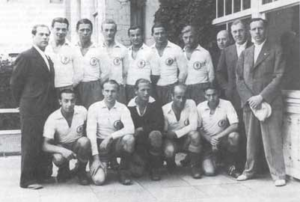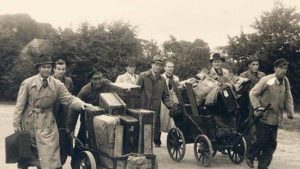Trying to understand the pyramid of immediate post-war German football requires time, patience and some sort of history thesis. The varying occupying zones ran their own leagues feeding into a national championship. The French (Oberliga Südwest), American (Oberliga Süd) zones and the combined Berlin Oberliga were the first to restart in 1946. The British zone’s two leagues (Oberliga Nord and Oberliga West) were the last to form in 1947, replacing the old Gauligas formed in 1933, or the Stadtliga. The Soviet zone did not form an official league, but in 1948 operated a 1 leg knock-out tournament called the Ostzonenmeisterschaft. The DDR-Oberliga would not form until 1950 and football in East Germany would go on to be the preserve of the people but also a tool of the state.
In 1948, these 5 tournaments would meet at the end of the year to decide the National Champion through a play-off series not unlike the modern NFL play-offs. It is in this tournament that one of the strangest stories in FCSP’s history would occur.
The 1948 Oberliga Nord Season
FCSP were known as the Wunderelf (Miracle 11). Karl Miller was able to build a team using decent contracts and the promise of sausages from his father’s butchershop near to the stadium. Amongst the post-war rationing, extra sausage could be as precious as any currency. Many players would figuratively head up the Elbe from Dresden.
It all came into fruition in the 1946/47 season when St. Pauli would win the Stadtliga, a year after being pipped on the final day by HSV.

In the 1947-48 season, FCSP won 17 out of 22 games scoring 73 goals and conceding 20. In modern football, they would have won the league on Goal difference. However, this not being a deciding factor, a playoff was required against the side joint top, again HSV. The neighbours won, 2-1 and therefore would enter the 8 team British zone play-off as Nord Champions.
St. Pauli played STV Horst-Emscher from Gelsenkirchen, winning 3-1. They drew 2-2 with Borussia Dortmund (West Champions) and finally won out 1-0 in a replay to set up a rematch against HSV. Again HSV won, this time 6-1. But reaching the final was enough for FCSP to qualify for the first National Championship.
Breaking into Berlin
FCSP were drawn against Berlin champions SG Oberschöneweide, one of the precursors to the modern day Union Berlin, with a tie at the Olympiastadion to look forward to.
1948 Berlin was something of a tinderbox for the Cold War. Berlin fell within the Soviet Zone but was divided between the four powers to prevent any one having total claim to Germany. However, as ideological tensions rose, the Soviets cut Berlin off from the rest of Germany. Supply was only allowed to what would become the West via three air routes into Templehof airport as all road, rail and even boating access was prohibited from June. This blockade put St. Pauli’s game under threat as they would be unable to enter Berlin.
Thanks to the tireless efforts of Carl Koppehel, a former DFB official who represented the Berlin Oberliga, St. Pauli were able to negotiate entry to Berlin with Soviet officials. The team’s motor vehicle could drive to the Berlin Zone border. But it could go no further. From here, the players were to load their suitcases onto handcarts and drag them across the no-man’s land. Once over the boundary, a vehicle would transport them to the stadium.

Maybe the trials and tribulations of their journey inspired the team more than sausages. In what became dubbed by the Sport Echo “Das Lehrstück des FC St. Pauli” (The Lesson of St. Pauli) the Boys in Brown won 7-0. 70,000 fans packed the Olympiastadion, and all that could be complimented of the Berlin side was their new sky-blue silk shirts and the efforts of Herbert Raddatz.
A hat trick from Schaffer, a brace from Machate and goals from Michael and Lehmann sealed the victory.
St. Pauli would have to travel to Mannheim for the Semi-Final against Nuremberg. Nuremberg had been due to play SG Planitz (who would become FSV Zwickau) in their Quarter final in Stuttgart. However, the Soviet authorities feared a case of Republikflucht (Republic flight, the act of heading from East to West Germany) and denied Planitz permission to travel. The rest appeared to benefit Nuremberg; after a tense 90 minutes that ended 2-2, Nuremberg scored early in extra time and would go on to beat Kaiserslautern in Cologne becoming German Champions.
St. Pauli would go on to hover at second in the Oberliga Nord for a few more years before eventually falling back with the crowd at the formation of the Bundesliga in 1963.
Historical Postscript
The game between St. Pauli and Oberschöneweide would be the only time East would meet West in a tie to determine German champions until Reunification. Oberschöneweide would qualify again in 1950 but like Planitz would be denied travel.
There would only be 17 club level meetings of East and West in the following 40 years. All of these were in European competitions. East German clubs would win only 3 of these games. In 1974, the only FIFA sanctioned meeting of the international sides happened in the World Cup. Jürgen Sparwasser scored the only goal in the Volkspark as the DDR overcame West Germany in the World Cup group game. Sparwasser would later defect to West Germany in 1988.
The fear of Republikflucht never left the East. Only 300 fans could travel to watch Magdeburg win the European Cup Winners Cup. Footballers were especially prized by the West as its popularity grew. Football was under appreciated by the SED who favoured Olympic Sports, and footballers were only ever treated as amateurs in reality.
